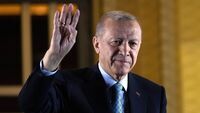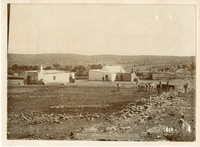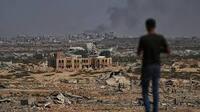Arnon Grunberg's Blog
October 18, 2025
Donations
 Aim
AimOn the board of peace – Zvi Bar'el in Haaretz:
‘Until four years ago, it would have been impossible to imagine the president of Egypt sitting with the Qatari ruler and the president of Turkey. Not only have they sat together, they all signed a joint document whose aim is to end the war in Gaza and prepare for a "Middle East peace" and even – world peace.
Now, the former foes, once at each other's throats, have taken on joint responsibility to run Gaza, ensuring that Hamas fulfills the commitments it made to U.S. President Donald Trump and that Israel does as it says. These countries are also supposed to supply soldiers to the multinational force, determine who will be members of the Board of Peace that Trump is appointing, ensure Hamas disarms and manage the reconstruction budget as well as any donations that flow into Gaza.’
(…)
‘Among the 13 conditions for lifting the blockade presented to Qatar were removing the Turkish military base established in Doha in 2014 and breaking ties with both Turkey and Iran.
Egypt initially joined the blockade because Doha "had consistently stood against Egypt, promoted the ideologies of Al-Qaeda and ISIS, and interfered in the internal affairs of Egypt and other countries." Now Egypt has ruptured its relationship with Turkey just as it had with Qatar in 2017.
The Turkish-Qatari undertaking in Libya managed to overcome resistance by the separatist general, Khalifa Haftar, who was supported by Egypt, Russia and the UAE. Not only did Haftar withdraw, Turkey and Libya signed an agreement to define their maritime economic border in a way that threatened Egypt's gas fields from its markets in the Mediterranean and Europe.’
(…)
‘The regional takeover, of course, also has implications for the status of these two countries inside the Trump administration. Trump's deep "love" for the ruler of Qatar is not due only to the luxury plane he gifted him, the golf courses he plans to build in the country or the massive investments Qatar has pledged to make in the United States. Formally granted the status as a "senior non-NATO ally" by Biden and home to the largest American base in the Middle East, Qatar may now hold the key to realizing Trump's 20-point plan.
While Mohammad bin Salman, the de facto ruler of Saudi Arabia, and Mohammed Bin Zayed, the president of the UAE, were excluded from the Sharm el-Sheikh "peace conference," it was Qatar's Sheikh Tamim bin Hamad Al Thani who signed the "Trump Declaration." Al Thani may be the strategic contributor to the reconstruction of Gaza, while Erdogan is expected to be the political strategist who determines the fate of the Strip.’
(…)
‘But Trump and Erdogan's tough dialogue is driven by shared interests that oblige them to cooperate.
Trump wants Turkey, which has not adopted the Western sanctions on Russia, to stop buying Russian gas, to ensure that Syria becomes a stable country, that the al-Sharaa regime signs security agreements with Israel, that Erdogan resolves the issue of the Russian defense systems that worries NATO, and that U.S. forces can finally withdraw from Syria after Turkey takes responsibility for the war against ISIS.
Turkey wants to return to the F-35 project from which it was expelled due to the Russian air defense affair. Erdogan is seeking Trump's backing for his policy towards the Syrian Kurds and to resolve the complicated legal problem of Turkey's Halkbank, which was convicted in the U.S. of circumventing sanctions on Iran and ordered to pay billions of dollars in penalties.
Erdogan himself is believed to be involved in the affair. He told reporters upon his return from his White House visit that Trump assured him that "the affair is over." But it is possible that it may be no more serious than Trump's call for Israeli President Isaac Herzog to pardon Prime Minister Benjamin Netanyahu.’
Read the article here.
Not the restauration of the English empire, but the restauration of the Ottoman empire.
Blair, just as a pawn, with some business interests in the region.
We will see if Gaza turns out to be very different from Afghanistan and Iraq.
Also, we will see when the first Turkish or Egyptian solders will enter Gaza. I would like to remind us all, of the Beirut barracks bombings in 1983.
See here.
But who knows, maybe this adventure will end in Singapore in Gaza. A golf course and obedience. The torture chambers will be well hidden, as always.
October 16, 2025
Dominant
 Force
ForceOn adventures ending – Iyad Abuheweila, Aaron Boxerman and Sanjana Varghese in NYT:
‘The public execution was captured on video.
Masked gunmen, some wearing green headbands associated with the Palestinian militant group Hamas, lined up eight captives in the middle of a crowded street in Gaza City on Monday. They forced the men to bend over, leveled their rifles at them, and opened fire, leaving their bodies in the dirt.
A Hamas internal security official confirmed that the video, which The New York Times geolocated to Gaza City, showed Hamas fighters executing Palestinian rivals. He spoke on condition of anonymity because he was not authorized to talk to journalists.
The execution took place just days after a cease-fire with Israel began on Friday and Israeli forces pulled back from parts of Gaza. Analysts say that Hamas appears to be trying to assert that it is still the dominant force in the territory, no matter how weakened it is after two years of war with Israel.’
(…)
‘After a visit to Israel on Monday coinciding with Hamas’s release of the remaining hostages in Gaza, Mr. Trump was asked by a reporter about the possibility of the group reasserting itself as a police force in Gaza and shooting rivals. Mr. Trump suggested the United States was not opposed, at least for now.
“They’ve been open about it, and we gave them approval for a period of time,” he said.
On Tuesday, Mr. Trump addressed the issue again, saying Hamas had “taken out a couple of gangs that were very bad,” and adding: “That didn’t bother me very much, to be honest.”’
(…)
‘After the clashes, armed Hamas fighters burst into nearby houses, checking identity cards to see who belonged to the Doghmosh family, said a Palestinian witness who asked not to be named for fear of retribution. He said his family spent hours huddled in the center of their home amid a hail of gunfire and explosions outside.
Then Hamas fighters showed up and ordered them to flee, he recounted.
At least 24 bodies arrived at Al-Shifa hospital in Gaza City from the Hamas-Doghmosh clashes on Sunday night, said Mohammad Abu Salmiya, the medical facility’s director. He said he did not know how many were from each side.’(…)
‘“This adventure was only ever going to end one way,” said Michael Milshtein, a former senior Israeli intelligence officer. “We armed and supported these militias, and now Hamas is coming for its revenge.”If Hamas attacks any of the clans affiliated with Israel, it would pose a “heavy dilemma” for the Israeli authorities, who would have to decide whether to defend them — thus breaking the cease-fire — or allow them to be killed or arrested, Mr. Milshtein said.
For now, at least some militia members say they have no plans to surrender to Hamas.
“We are preparing to defend ourselves by any means necessary should Hamas attack,” said Mohammad al-Mansi, 21, whose father leads a small armed group opposed to Hamas in northern Gaza.’
Read the article here.
See also South Lebanon, after the departure of Israeli troops in 2000.
Hamas, after some fighting I assume, will reestablish itself as the main force in Gaza. I don’t see any international force coming into that territory.
And Trump will be distracted soon, the next theater after all seems to be Venezuela.
October 15, 2025
Map
 White men
White menOn the forgotten thinkers - Geertje Bol in TLS:
‘Eileen O’Neill’s foundational article “Disappearing Ink: Early modern women philosophers and their fate in history” (1998) was revelatory for me as a graduate student. Her self-professed aim in writing it was to “overwhelm you with the presence of women in early modern philosophy”. Based on painstaking archival research, O’Neill discussed a vast amount of early modern women who published philosophical tracts and contributed to philosophical debates.
Suddenly, all my years of studying Great White Men seemed not only unfortunate but also, as O’Neill put it, “scandalous”.’
(…)
‘Ostertag notes that O’Neill’s work went a long way to making “the study of women philosophers … mainstream”. It is certainly undeniable that her efforts put many women philosophers on the map and, crucially, made it impossible to use the “there were no women philosophers” excuse for an exclusively male canon. Through her tireless archival work, she also made the study of past women easier for other scholars. As her colleagues Christia Mercer and Louise Antony affirm, “all feminist philosophers owe O’Neill an enormous debt”.’
(…)
‘In the words of the professor of gender studies Meaghan Morris, what is there “to be gained by inscribing” past women’s thought “under the ancient sign, ‘philosophy’”? Is the insistence on the label of philosophy helpful for the inclusion and study of past women’s ideas? In his introduction to Disappearing Ink, Ostertag paraphrases O’Neill’s reply to Morris as follows: only in “uniting beneath [the] standard” of philosophy can women “reclaim their rightful place in philosophy”. Ironically, this response reinforces the idea that philosophy is the only valid site of intellectual value – an idea responsible for the erasure of women from philosophy in the first place.’
Read the review here.
Where does the philosophy end and where is it exactly that others endeavors of intellectual labor begin?Perhaps the overestimation of philosophy (in some circles) is also a fallacy of romanticism and other sorts of nostalgia. There was a time that intellectual competition was a first and foremost competition for philosophers and scribes.
The scribes and the philosophers have moved to the periphery; the novelists have moved in the same direction.
The center is something for influencers.
October 14, 2025
October
 Government
GovernmentTo sum it all up – Isabel Kershner in NYT:
‘Israeli officials said about 1,200 people were killed in Israel and 251 others were abducted to Gaza during the Hamas-led attack on Israel in October 2023 that ignited the war. Hamas had already been holding two Israeli civilians for almost a decade and the remains of two soldiers killed in ambushes in Gaza in 2014.
Four women were released early on in October 2023, and a female soldier was rescued in a military operation that month. During two temporary cease-fires, in November 2023 and early this year, a total of 135 hostages were freed, according to government data. The Trump administration negotiated the release of an Israeli-American soldier in May. Seven more hostages were rescued alive by the Israeli military.
The remains of 59 captives who did not survive were returned to Israel for burial before Monday’s exchange, according to the Israeli government.
More than 67,000 Palestinians have been killed during Israel’s two-year counteroffensive in Gaza, according to local health officials, whose data does not distinguish between civilians and combatants, but includes thousands of children.’
Read the article here.
What was achieved?
Benjamin’s point that history is an endless cycle of catastrophes has been enforced, so much is for sure.
October 12, 2025
Dreams
 Tale
TaleOn successful martyrdom - Neal Ascherson in NYRB in 1980:
‘“The bulky parcel was sewn up in a piece of coarse cotton cloth to keep its pages together, and then in brown paper…. The manuscript was very indifferently written; many blots, many erasions were on almost every page, and here and there a grease mark as though the tallow candle, by which she probably wrote, had dropped a tear.” In this package from South Africa, still smelling of the woodsmoke of the Karoo back country, was the first version of The Story of an African Farm. It was 1880; Olive Schreiner, governess in a remote Afrikaner farm, was only twenty-five years old. She had written one of the most extraordinary novels of the century. To describe it as a Bildungsroman, the tale of a young girl’s search for truth and independence, is to evade its lonely originality. The Story of an African Farm is an orphan without close relations in literature and defies classification. Olive Schreiner herself never wrote anything else to compare with it in quality, during the remaining forty years of her life. Today she is remembered almost exclusively for African Farm, and First and Scott, though they will convince every reader of this biography that this is unfair, sadly concede in their final sentence that “perhaps she will always be discovered” through that early novel.’
(…)
‘From Man to Man, which she hoped would be her major novel, was tinkered with through most of her life but never completed: these biographers report that the manuscript is interesting but indigestible. Dreams, a collection of allegories written in a vague, luxuriant style, was something of a popular success before the war, especially with radically minded women, but, to judge by the extracts here, is hardly readable today. African Farm overshadows everything.’
(…)
‘She was not yet nine years old when she underwent a sort of conversion experience. Bewildered and miserable, the little girl sat on the veld and watched the sun rise. “And, as I looked at that almost intolerable beauty, a curious feeling came over me. It was not what I thought put into exact words, but I seemed to see a world in which creatures no more hated and crushed [one another], in which the strong helped the weak, and men forgave each other and did not try to crush others but to help. I did not think of it as something to be in a distant future; it was there, about me, and I was in it, a part of it.”’
(…)
‘Olive Schreiner was very much a late-Victorian with her belief in inevitable progress and the force of will power, and the vision—in itself one of those revelations of unio mystica which are given to a few in all ages—came in retrospect to be a message about cooperation, pacifism, socialism. The meaning she decided to extract from the vision was not mystical but in the end political.’
(…)
‘In 1881, Olive Schreiner arrived in Britain for what was to be a stay of eight years.
African Farm was published the following year, an immediate success both of scandal and esteem. Olive Schreiner entered the turbulent, iconoclastic world of the late-Victorian intellectuals. A new heaven and a new earth were eagerly being prepared; early socialism had all the millennial promise of the vision on the veld, offering not only the end of selfish capitalism and imperialism but a total revolution in human relations, including the relations between the sexes. The passionate feminism of her novels was now put to the test. But Olive, well known as she soon became in all these progressive groups, was by nature not a “joiner.” She contributed her ideas and her friendship, but was never committed to any one movement, party, or force.’
(…)
‘Olive’s difficulties about sex were intellectual as well as emotional. As a “free woman,” she wrote voluminously about sex, or rather about the “eternal and blissful union of two souls” in which a physical element was suggested rather than described. She either invented or co-invented that peculiar but immensely popular notion of “sexual intercourse as a sacrament,” something pure and great “to be partaken of between two souls, not only for the production of children, but sometimes going even further and consecrating the two who partake of it to a life…of the highest good and beauty.”’
(…)
‘She was a pre-Freudian, for whom the ego and conscious will were free agents, and physical passion their enemy.’
(…)
‘She died in 1920, and was buried on a hill overlooking the Karoo. Not long before, she had said that she was “only a broken and untried possibility.” Ruth First and Ann Scott sensibly retort: broken, perhaps, but hardly untried. African Farm, as the story of a girl who would follow her own chosen destiny at the cost of loneliness and even death, was a sort of program for Olive Schreiner’s life. “She made important claims for herself,” the biographers comment, “and in her struggles to reach them she savaged herself.” She never reconciled “her needs and her sense of self as a woman with those of her work as a writer.” The woman suffered, and so did the writing. But First and Scott would not, as some psychoanalysts might, write “failure” under this unresolved, unhappy life. These are evangelical biographers, and for them the life of Olive Schreiner is not a defeat but a successful martyrdom.’
Read the article here.
When is life a defeat? Fail again isn’t it, fail better.
The novelist should not be too much of an idealist, otherwise the work will suffer.
The longing for purity is understandable but self-defeating.
October 11, 2025
Relief
 Beginning
BeginningOn a reality check – Jack Khoury in Haaretz:
‘While the announcement sounds like a new beginning, it may prove to be just a brief pause in a much longer story whose ending is still nowhere in sight. Trump is presenting the deal as a peace agreement, but no one involved is speaking about peace in any real sense. There are no discussions of borders, sovereignty or governance. The future of the West Bank and the link between it and the Gaza Strip remain distant and undefined.’
(…)
‘"The immediate death has stopped – that's what matters," said one resident of Gaza City. But behind the relief lies deep fragility. The true test now is in implementation: how Trump and the international community will enforce the deal, who will monitor it, and what hidden clauses or disputes may still emerge in the coming days.’
Read the article here.
Trump pushed Hamas in signing a deal that might turn out not to be a deal at all.
It’s very well possible that now the world will soon forget about Gaza and move on to the next conflict, wherever that may be, in the meantime the annexation (de facto) of the West Bank will continue, and Gaza will be rebuilt (sort of) so that the new buildings can be bombed in the next war. (There must be something to bomb after all.)
The Palestinians will be forgotten, antisemitism will rise, and at a certain point Trump will be history as well, like Nixon, Mao, Arafat and other great men.
October 10, 2025
Way
 Recipient
RecipientOn the end of the war – Amos Harel in Haaretz
‘From the moment Steve Witkoff, U.S. President Donald Trump's envoy, landed in Sharm el-Sheikh on Wednesday, it was pretty clear that a deal had been agreed on. Witkoff arrived in Egypt with one goal – to finalize an agreement – irrespective of the reservations of the sides. That's what his boss wanted; he's locked into another goal – being awarded the Nobel Peace Prize, whose recipient is to be announced on Friday, in Oslo.
The American steamroller was put into motion on both Israel and Hamas, and also on the mediating countries of Qatar and Egypt, and the newcomer, Turkey. When Trump starts sounding like Tony Soprano, no one can really get in his way. And Prime Minister Benjamin Netanyahu perhaps less than anyone.’
(…)
‘The key moment that led to the signing of the deal before dawn on Thursday is clearly emerging: the failed Israeli attack on Doha on September 9 in an attempt to wipe out Hamas' negotiating team. Netanyahu gave Trump a vague heads-up about his intention, but that didn't assuage the president's wrath afterward.’
(…)
‘The prime minister will try to frame the end of the war as a success: Hamas will return all the hostages without the IDF withdrawing from the whole Gaza Strip; Trump will visit Israel and speak to the Knesset, where he will undoubtedly praise his close relations with Netanyahu.’
(…)
‘Moreover, it's perfectly clear that if it were up to Netanyahu alone, we would not have arrived at an agreement.
Last January, just before taking office, Trump urged Israel to conclude the previous hostage deal. Netanyahu blew it up, unilaterally, in March, by resuming aerial attacks on Hamas (in one sortie nearly 400 people were killed, among them top figures in Hamas' political arm and many civilians).
Only Trump's personal intervention, after a delay of seven more months, has now apparently brought this long and painful saga to an end. The bottom line is that Netanyahu capitulated to Trump. That's what happened here.’
(…)
‘The Palestinians believe they have achieved internationalization of the conflict in a way that has never occurred before and in complete contrast to Netanyahu's declared goals.
Many issues remain open, apparently by design. For the Americans, it's important to complete the first stage: the release of 48 hostages, living and dead, in return for almost 2,000 Palestinians, including 250 terrorists with life sentences for murder. They hope to arrange everything else afterward.’
(…)
‘When Yahya Sinwar and Mohammed Deif ordered the murderous Nukhba Force to infiltrate Israeli territory on the night between October 6 and 7, two years ago, it's likely that they were at least partially able to anticipate what to expect if their plan succeeded. Hamas prepared for the assault – Al-Aqsa Flood, as it was dubbed – over the course of at least five years. The decision to launch it was based on an analysis of the internal divisions in Israel and the low level of alert of the IDF.
The attack had far-reaching goals: the conquest of the area that was the responsibility of the IDF's Gaza Division, in preparation for an Israeli defeat (as well, perhaps, as a subsequent attack by the Shi'ite axis led by Iran and Hezbollah); restoration of the Palestinian question to the top of the regional and international agenda; disrupting the advanced process of normalization that the Biden administration had initiated between Israel and Saudi Arabia; and revenge for the unilateral measures taken by the Israeli government and police on the Temple Mount.
The brutality of the terrorists wasn't a bug in the plan but an actual feature. Through the use of murder, rape and horrific abuse, Hamas in large measure dragged the Israelis into the mud along with Hamas itself. In light of the scale of the massacre, Israel responded as it tends to respond: unleashing tremendous force, almost blindly. The main goal was deterrence, in the vague hope that the other side would feel the cost and be afraid to make similar moves at least in the coming decades.’
Read the article here.
Trump i.e. the Soprano in the White House as an unlikely Messiah.
The Americans had to come twice in the last century to save the Europeans.
Now Trump, had to save the Israelis, for the time being.
Again, the end of the war, at least that’s what it looks like now, is good news. But I remain extremely skeptical that the status quo will change.
Perhaps, deterrence is reestablished. But, see the article, against what cost.
October 9, 2025
Government
 New
NewOn 2068 - Zvi Bar'el in Haaretz:
‘"I said that we'll change the face of the Middle East. Syria isn't the same Syria, Lebanon isn't the same Lebanon, and the head of the axis, Iran, also isn't the same Iran," said Prime Minister Benjamin Netanyahu in December 2024, summarizing the "new" Middle East.
Five months later, he again claimed, "In the war's 600 days, we've actually changed the face of the Middle East." He said that again on the eve of his trip to Washington in July 2025 and again on Saturday, declaring, "From victory to victory, together we've changed the face of the Middle East."’
(…)
‘American presidents, both Democrats and Republicans, were sure that they held the key to change in their pockets. In 2006, five years after the U.S. invasion of Afghanistan and three years after the invasion of Iraq, President George W. Bush told the UN General Assembly, "We're seeing that bright future begin to take root in the broader Middle East… Five years ago, Afghanistan was ruled by the brutal Taliban regime... Now this seat is held by the freely elected government of Afghanistan, which is represented today by President Karzai. Five years ago, Iraq's seat in this body was held by a dictator who killed his citizens, invaded his neighbors... Now Iraq's seat is held by a democratic government..."’
(…)
‘President Barack Obama was confident that the entire Middle East would change for the better following the Arab Spring revolutions and the toppling of President Hosni Mubarak in Egypt, President Zine El Abidine Ben Ali in Tunisia and President Ali Abdullah Saleh in Yemen. Tunisia is now ruled by a dictator, who was originally elected in a democratic process, the Houthis now control 60 percent of Yemen's population and a third of the country, and it is no coincidence that Netanyahu avoided listing them as Israel's successes in the region.’
(…)
‘Assad was a murderous president who was aided by Iran and Hezbollah to slaughter his people in exchange for his help. But Israel wasn't particularly concerned by the massacres in Syria or by the millions of Syrian refugees, nor was Trump's heart moved by the atrocities, because in practice, Assad was "good" for Israel.
Syria's skies were open to the Israel Air Force, Assad never declared war on Israel, and he even prevented the Iranian Revolutionary Guards Corps' Quds force from operating against it. A "strategic alliance" was formed with Assad's Syria, under which Russia guaranteed the regime's existence and security and gave Israel an almost unrestricted work visa.’
(…)
‘But the practical test for the Lebanese government is still ahead and passing it won't be easy. Eliminating Hezbollah's leadership did not remove the organization from Lebanon's political fabric. Its representatives are still in the government and parliament and the threat of civil war hangs over the country if the government decides to confront Hezbollah by force.’
(…)
‘Conversely, even after the strike, the success of which is still undergoing evaluation, the nuclear threat has not been removed and will still be a "hot front" so long as no agreement is reached that will guarantee supervision and control over Iran's nuclear program. Needless to say, the original nuclear agreement signed in 2015, which Trump unilaterally broke under Netanyahu's massive influence, would have ensured that Iran's nuclear program would be limited to minimal enrichment through the end of 2025 and be subject to restrictions and intensive supervision at least until 2030.’
(…)
‘On May 15, 2008, on Israel's 60th Independence Day, U.S. President George W. Bush gave a rousing, optimistic address to the Knesset in which he fantasized about the "new" Middle East.
"Israel will be celebrating its 120th anniversary as one of the world's great democracies, a secure and flourishing homeland for the Jewish people. The Palestinian people will have the homeland they have long dreamed of and deserved – a democratic state that is governed by law, and respects human rights, and rejects terror. From Cairo to Riyadh to Baghdad and Beirut, people will live in free and independent societies... Iran and Syria will be peaceful nations... Al Qaida and Hezbollah and Hamas will be defeated, as Muslims across the region recognize the emptiness of the terrorists' vision and the injustice of their cause."
A wonderful vision; we just have to pass the time until 2068.’
Read the article here.
2068, fair enough. We’ll wait.
In the meantime, I mostly agree with this analysis. The Middle East hasn’t changed much.
Hamas is not defeated, Iran is not defeated, Hezbollah is not defeated, setbacks yes, some more severe than others.
But besides all this, there is no reason to be cynical about the deal between Israel and Hamas. Trump did accomplish something. Let’s see when the Nobel is coming his way. Maybe he’ll calm down a bit after the Nobel.
Now that would be a breakthrough.
October 7, 2025
Members
 Diplomacy
DiplomacyOn the aftermath – Mairav Zonszein in NYT:
‘Since the Hamas attacks on Oct. 7, 2023, Israel has ostensibly been focused on re-establishing its security in the region, both by rebuilding its ability to deter adversaries and dismantling their military capabilities, but also by being willing to engage in perpetual war, a state of affairs that has transformed Israeli society and power dynamics in the Middle East. Israel has been brazen, unpredictable and, until the recent proposed cease-fire, all but unstoppable. In most arenas, it continued to use force without engaging in any viable diplomacy. The most notable example of this is, of course, Israel’s destruction of Gaza, which has made the strip largely unlivable, as some cabinet members openly intended.’
(…)
‘All of this should concern Israelis. Even if the war ends, there will then need to be a moment of soul-searching about the collective society’s responsibility for the years of mass killing and displacement. Palestinians desperately need this war to end. But so do Israelis.
The liabilities of Israel’s security doctrine have become increasingly evident. It was ultimately the failed attack in Doha — striking the heart of the Gulf, where Israel has benefited from the continued shield of the Abraham Accords — that backfired, prompting concerted pressure on Mr. Netanyahu to meet Mr. Trump’s demand for an end to the war. The Netanyahu coalition’s recent push into Gaza City not only unfolded against the will of some in the Israeli military and most Israelis, it helped fuel a growing global consensus that Israel’s campaign in Gaza amounts to genocide. Israel’s diplomatic isolation — on full display at the United Nations last month as major Western nations recognized the State of Palestine and Mr. Netanyahu addressed a hall of largely empty seats — was making the country look more and more like a self-defeating, irrational actor than the regional hegemon it aspired to be.’
(…)
‘When a U.S.-negotiated cease-fire in Gaza went into effect at the start of the year, Israel could have taken the opportunity to get the hostages back and achieve its goals of an improved regional security landscape. Instead, it broke the cease-fire and proceeded to cause widespread starvation among Palestinians in Gaza.’
(…)
‘Usually, a victory might be understood as an endpoint, or at the very least a decisive outcome that does not require further action. In Israel, though, winning has seemed only to yield more rounds of warfare. Israel is not a victor, but a perpetual fighter.
Last month, Mr. Netanyahu delivered what has come to be known as his “super-Sparta” speech. Comparing the country to the ancient cities of Athens and Sparta, Mr. Netanyahu acknowledged that Israel is becoming increasingly isolated and that its economy and military will have to become more self-reliant. This was not a slip of the tongue: Just as he had conditioned Israelis to become accustomed to constant war, he was also working to normalize the country’s isolation.’
(…)
‘It’s true that a majority of Israeli public and military have, for months, called for a deal to end the war. But none of the actions Israel has taken over the past two years would have been possible without a willing military, news media and society, including tens of thousands of reservists carrying out orders. It is not just that many Israelis have no problem with the idea of expelling Palestinians from Gaza, or are averse to Palestinian self-determination and a two-state solution. At the heart of it, many Israelis — whether out of conviction, fear or deference to those in power — seemed to believe that the way to security is to maintain dominance and crush everyone in their path.
Mr. Trump, for all of his bluster and self-interest, has tried to alter that equation.’
(…)
‘Israelis will know true security only when it is felt by everyone around them, not one country, alone.’
Read the article here.
Addicted to paranoia and perpetual war. Addicted to being the irresponsible bully of the region. No more brains, just muscles.
Is this liberation? Is this Messianism?
Soft power (i.e. diplomacy) might be out of fashion, but sometimes even in times of Trump and Putin not everything can resolved with brute force. See Hobbes and Kant, among others.
On the other, as long as I’ve been around, I have heard the formula that no security can exist, when not everyone in the region feels more or less the same security.
We repeat the same phrases over and over and we hope that this will alter reality.
Or maybe we don’t even that.
We just hope that the we will be recognized as the good guys.
October 6, 2025
Dispose
 Immortality
ImmortalityFor an art project I’m looking for books written by me. We need approximately sixty more books before October 9.
Anyone willing to dispose of books by AG can contact info@arnongrunberg.com.
No usual compensation will be offered.
Immortality is at stake.
Arnon Grunberg's Blog
- Arnon Grunberg's profile
- 415 followers



